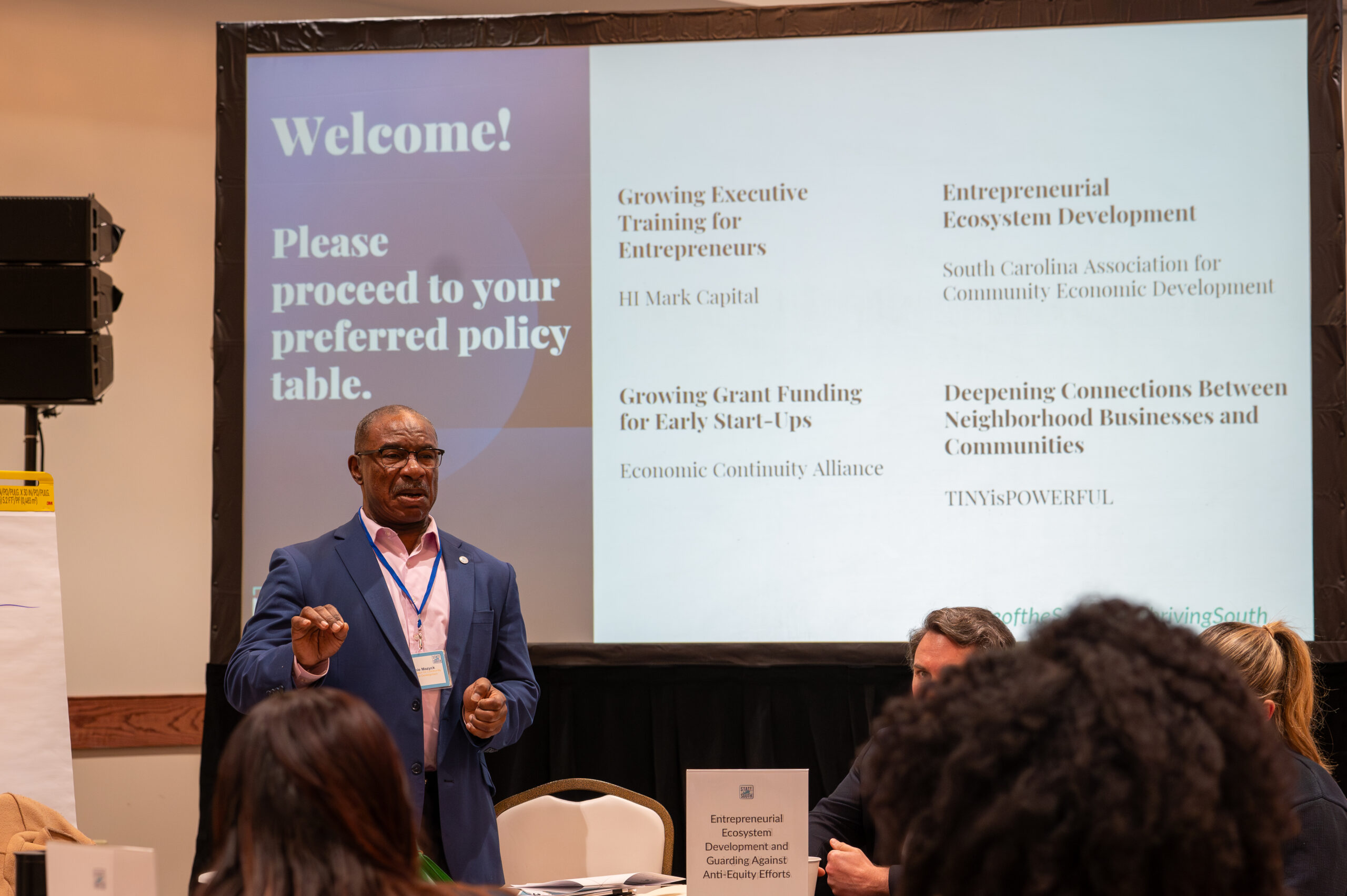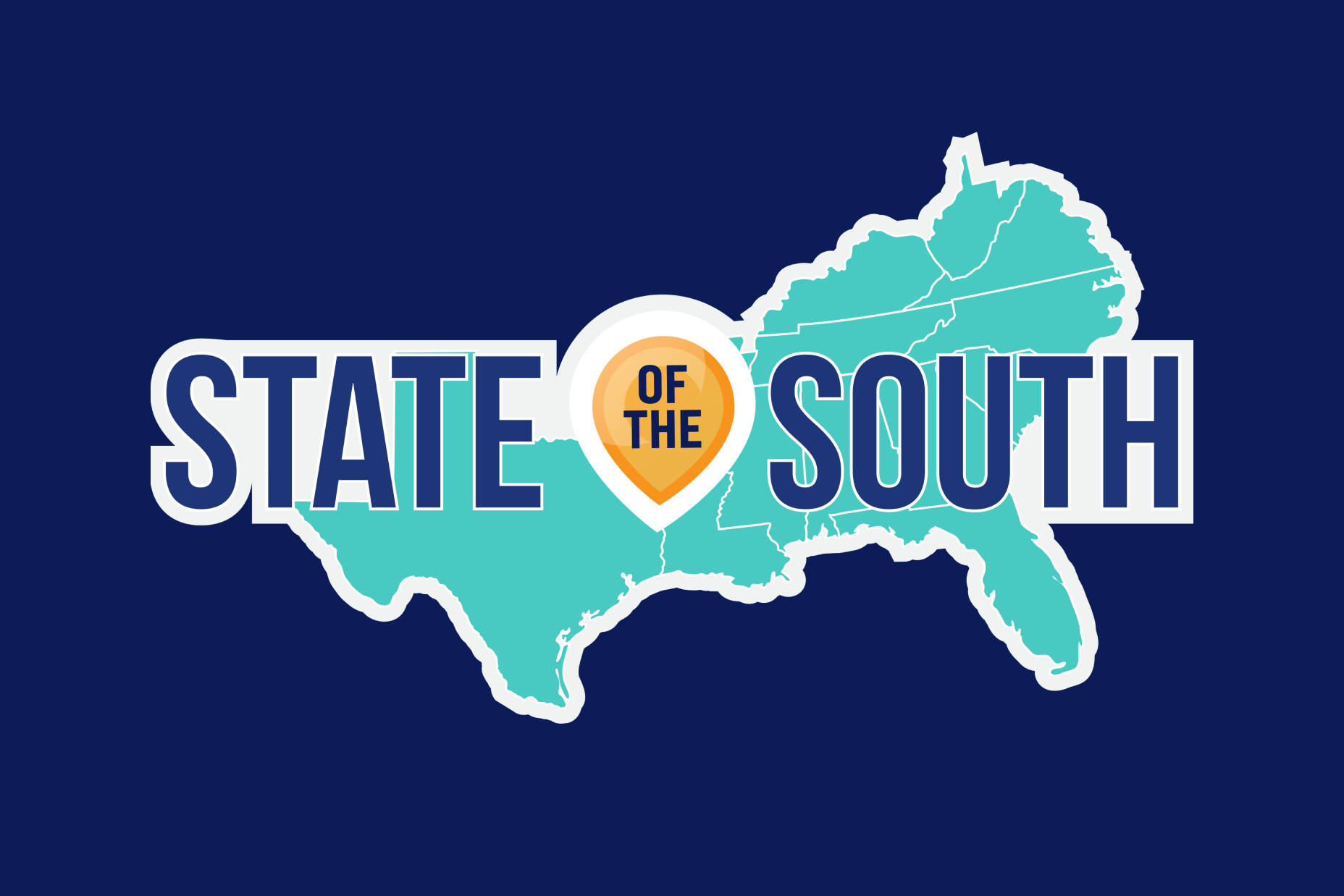Overall Reflection-Reflections from State of the South: Charleston, South Carolina
Apr 09, 2024

In February, State of the South held its fifth convening in Charleston, South Carolina. Meeting over two days, community members, nonprofit leaders, business owners, policymakers, and artists gathered to discuss how to make Charleston, South Carolina, and the larger South equitably accessible to everyone.
Following the event, we invited panelists and participants to reflect on their experiences. We’re honored to share with you this reflection from Bernie Mazyck at South Carolina Association for Community Economic Development.
Journey…Destination…Arrival. These are words that resonate with me when I ponder the work of Equity…Justice…Opportunity. My work, which focuses on improving the quality of life for poor, marginalized and oppressed people in South Carolina, is rooted in a sense of calling, “To bring good news to the poor, liberate the oppressed, declare a season of God’s favor.” But when I turn on the news I see injustices, poverty, and predatory lenders charging poor people interest rates of 300% on a small dollar emergency loan. It’s expensive to be poor in South Carolina. And when we consider statistics that point to disparities among marginalized people in the South, especially if you are a member of a marginalized group (African American, Hispanic, Native American, and rural), you may shrink into a state of depression and dispiritedness. These thoughts and emotions set the table for the recent convening in North Charleston, of the State of the South, hosted by North Carolina-based MDC from February5-7and which provided a space to not only reflect upon our current situation but also to reimagine the possibilities for equity and prosperity in our state.
The South, and especially South Carolina, is a contrast in narratives. On one side, you have the history of slavery and oppression, which continues to cast its long shadow over the present and the future prosperity of the state. That history continues to play a role in the disparities among people of color in almost every indicator ranging from health, wealth, educational attainment, and social status. But the South, including South Carolina, is also experiencing economic growth at a level never experienced before in its history. During State of the South, MDC President & CEO John Simpkins shared a data point that was quite revealing. He stated that, “The six (6) southern states (including South Carolina) contribute more to the country’s gross domestic product (GDP) than all states in the northeastern corridor combined.” This data point highlighted tremendous opportunities for racial equity, justice, and economic opportunities for members of our communities who continue to be left behind.
The stated goal of the State of the South convening is to amplify the issues that exacerbate racial inequity, economic insecurity, and poverty. MDC operates with a special intention of supporting an “equity agenda”, which in the current national climate is under political attack. The State of the South program is not new, but the re-framing of this program is new. Instead of producing a printed report and sharing current and powerful data and strategy recommendations for the future prosperity of the region with policymakers, industry heads, and academic experts. MDC decided to convene policymakers, along with nonprofits and philanthropic leaders, community members, and artists to understand the policies and investments needed to support marginalized communities and encourage systems change to bring about racial equity. From this participant’s perspective, bringing relevant data to SC about the status of prosperity in state was powerful enough. But it was even more impressive to contextualize and ground the data in real-life experiences in South Carolina with real people in the state and to also discuss real strategies to achieve equity and justice for the most marginalized people in the state.
During State of the South, I was asked to co-facilitate a session titled “Legislative Advocacy for Nonprofits: Strengthening Nonprofit Coalitions.” I was fortunate to be joined by Courtney Thomas of The Grove Action Fund. And we covered the mechanics of the legislative process and how laws are made at the Statehouse in Columbia. But what was most compelling to me as I facilitated this session was how much participants in the session were energized to be reminded that their voice matters in the legislative process. They began to realize that they can bring about policy change through advocacy. For them, the power of advocacy was the means to help people become more involved in important decisions about their lives. It became clear to me that the nonprofits and community leaders in the room were realizing that they had the power to influence policies in South Carolina. Policies that can help us realize racial equity, social justice, and economic prosperity for all of South Carolina’s citizens. A real sense of empowerment was observed that day.
There is a concept among the Akan people of Ghana called “Sankofa”. In the Twi language of Ghana, “Sankofa” literally means, “go back and get what you lost and bring it forward.” Sankofa was in full display during this session on Legislative Advocacy for Nonprofits, because as we retraced the journey of the most powerful and transformative advocacy efforts in the nation’s history, we realized the strategies of the past still have relevance today. By revisiting the powerful system changes that occurred as a result of the Civil Rights movement of the 1960s, and more recently the Black Lives Matter Movement, we realized the strategy for racial equity systems change is still the same…Collective Action. In revisiting the coalitions of the past, we can see the achievements of historic policies from which we are still benefiting. System-changing policies such as the Civil Rights Act of 1964 and the Voting Rights Act of 1965 provided equal access to public accommodations and equal access to vote for African Americans. These are rights and privileges illuded to in the US Constitution but are not “self-evident” or “self-actualizing.” Not until we work to make them real and actual in our lives today. Even in South Carolina, we achieved policy success through collective action with the Community Economic Development Movement. The collaboration and mobilization of diverse groups and stakeholders convinced the SC General Assembly to pass the Community Economic Development Act, providing state resources to organizations serving low-income communities.
But the work is not yet done. We are on a journey, and the destination is an economy and a society where everyone thrives no matter their race, ethnicity, or social status. And our arrival will be marked with a great celebration.
Bernie Mazyck is the President and CEO of South Carolina Association for Community Economic Development. Visit scaced.org for more information.







